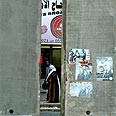
Beyond the concrete wall
Palestinian distress slowly disappearing from view, until next eruption
In Nadem's backyard there's a large shadow of an old eucalyptus tree that draws its water from the underground pipes of the crowded refugee camp of Deheishe, as well as from the sewer and old wells. Dates grow nearby, and purple grapes fall from the grapevine that has climbed to the roof.
Yet inside the house, there has been no water for two weeks. The camp's water supply was disconnected and the pipes were empty, Nadem tells me. Those who could afford to pay NIS 300 (roughly $70) ordered a tanker that filled the water tanks placed on the roof for the frequent periods of shortage.
There was drinking water, but no water for bathing. At the height of the heatwave, which was also suffered by Israelis despite our many air-conditioners and large quantities of water, there was not even one drop of water in the camp's faucets.
I didn't know about it, and Nadem didn't tell me about it on the phone. It only became apparent when I went to visit Deheishe, like a concealed secret of the poor, or the hidden distress of a neighbor in your building, where you don't know what's happening beyond your walls.
What do I know of the distress of people near me, in Israel? Distress is like an epidemic that spreads secretly. Many of those afflicted with it are silent. Scared to talk, as if this discovery will lead to ostracism.
I see distress within the Green Line here and there during my travels around the country. Here and there, something also makes it to the newspaper. Yet what happens there, beyond the wall that rises between us and the neighbors in Bethlehem – this is completely hidden from view.
For two weeks, at the height of the heatwave, there was no water in the faucets. If you tried to turn on the faucets, all you heard was a gurgling sound. Big deal. They should drink flavored bottled water.
Nadem says they went out to protest over the water. All the thirsty people and those desperate for a shower set tires on fire and yelled "We want to shower" and "We want to drink," while hurling stones at police officers. Only after the last demonstration, suddenly the water was back.
A weak flow, as always, because of a regular malfunction in the old water system, or because there's no money, or because a pump broke down, or perhaps the water sources were depleted. Because all of us, them and us, pump from the same springs and underground water reservoirs, only we pump 10 times as much, because we are in control.
Every time he comes to Tel Aviv, Nadem is impressed by two things: The greenery and the powerful shower stream.
Life of improvisation and survival
I saw that over there they sometimes pass over a green water hose from one house to the next in order to help a neighbor that has no water. They are so sick and tired of the trouble and pressure that their fury is directed at the Palestinian Authority. What could be worse? They ask. At least Hamas will put things in order.
This is a thought that stems from thirst and helplessness and the summer heat more than it stems from common sense, because many do not want a Hamas rule and religious restrictions, yet they are completely fed up with the PA because of its futility.
And in the midst of all this, a life of improvisation and survival continues over there. Nadem travels from one place to another on a red motor scooter, without a license and without a helmet, and once a week he sits from morning until evening at his mother's home at the camp, because she is losing her memory and may get lost, and nobody over there even thinks of putting her at an old-age home, assuming there's one there.
At a small shop in the camp, we were offered some sabra fruit as a comforting candy – five kilos for NIS13 shekels (roughly 11 pounds for $3) – and life goes on, with or without water, because life itself is like water: When it's blocked, it will always find a crack and continue to flow.
I saw all this during a quick visit to our neighbors, at a place that keeps on disappearing from view beyond the wall. A poor, tense, and hot place. We shall be reminded of it only when it erupts like a volcano, when it will no longer be able to bear it all.
And meanwhile, it's as if quiet prevails. As if. Because Friday evening I was stuck with my family at a huge traffic jam, when the entire country was clogged by hundreds of roadblocks, because of fears over two illegal Palestinian aliens who ran away from a checkpoint, as if to remind us of the power of those we are trying to forget beyond the concrete wall.










